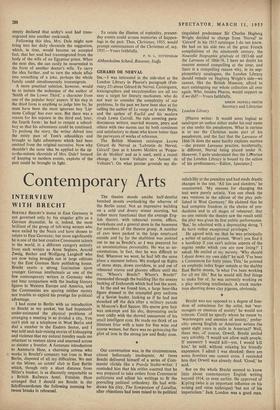GERARD DE NERVAL
SIR,-I was interested in the side-shot at the London Library in Pharos's paragraph (Feb- ruary 25) about Gerard de Nerval. Cataloguers, lexicographers and encyclopedists are all too easy a target for literary marksmen, who do not wait to consider the complexity of our problems. In the past we have been shot at for calling the author of Le rouge et le noir Beyle, and the author of Euclid and his modern rivals Lewis Carroll. No rule covering pseu- donymous writers, married women, peers and others with two names can be both consistent and satisfactory to those who know better than the purveyors of works of reference.
The British Museum catalogue knows Gerard dc Nerval as 'Labrunie de Nerval, Gerard' (just as it knows Moliere as 'Pogue- lin de Moliere' and as it used, until a recent change, to know Voltaire as 'Arouet de Voltaire'). On what precise grounds my dis-
tinguished predecessor Sir Charles Hagberg Wright decided to change from 'Nerval' to 'Gerard' in his 1913 catalogue I do not know. He had on his side two of the great French compilations of the nineteenth century, the Nouvelle biographie generale of 1853-66 and the Larousse of 1866-76. I have no doubt his reasons seemed compelling at the time; and there is a compelling reason why, in its sup- plementary catalogues, the London Library should remain on Hagberg Wright's side—we cannot, like the British Museum, afford to start cataloguing our whole collection all over again. Who, besides Pharos, would support us if we did?—Yours faithfully,
SIMON NOWELL-SMITH
Secretary and Librarian London Library
[Pharos writes : It would seem logical to catalogue an author either under his real name or else under his pseudonym. What is curious is to use the Christian name part of his pseudonym, and the fact that the Larousse of 1866-76 does the same hardly explains matters —the present Larousse practice, incidentally, is different, Nerval being placed under N. However, I quite understand that the Littrarian of the London Library is bound by the action of his predecessors.—Editor, Spectator.]










































 Previous page
Previous page